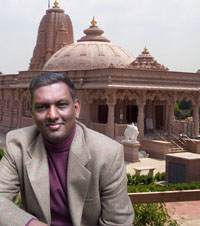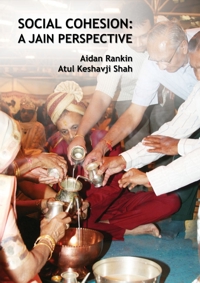Jain society has always been characterised by its profound respect for education. It has produced generations of scientists, mathematicians, astronomers, law-makers and also artists and craftspeople, for the concept of education is inclusive rather than narrowly defined. Since the time of Mahavira, Jain education has been regarded as the birthright of people of all social and economic backgrounds. Each person also has the responsibility to acquire as much knowledge as possible and put it to good use. Jain culture has been exceptional in its equal emphasis on the education of women and men.
The pan-Indian goddess Saraswati is worshipped for knowledge, creativity and wisdom. She also has a sitar and is worshipped as a goddess of arts. The goddess personifies sacred wisdom, which unites reason with imagination and creativity. Faith is also intertwined with reason - something which many modern scientists completely deny. Jains have the highest respect for Saraswati and she has given them the wisdom to survive and prosper as a minority community. Her statue could be installed in the House of Commons to show the integration of faith, reason and the arts.
For education to be effective, it needs to awaken the spirit of curiosity and learning in each student. Its approach should be less about facts and memorisation and more about logic, creativity, experience and analysis. Reason and art should be part of teaching until adulthood rather than taught separately. Spiritual values should also be integrated into the curriculum and not separated as an optional subject. They form core components of personal development and help mould the students to a broader base of science and understanding than is presently taught.
Diversity and understanding of different religions, cultures and value systems can also help significantly in cultivating respect and tolerance among young people. All this does mean that schools need to be much smaller and more local in scale so that there is a real sense of personal identity and community in the moulding of our children and youth. The size of first and middle schools is still reasonable, but the size of secondary schools seems too large to encourage community building among the youth. This may explain why there are so many social problems at this level.
Travel and experience should be given greater emphasis in the curriculum such that knowledge is not just based on books and websites, but also on the use of the various senses to experience the truth. Wisdom should be articulated through stories, science and art such that students begin to see the various dimensions and facets of truth. In this way, there will be an understanding that truth is not absolute, but something which changes over time and depends on the perspective of the seer. The limitations of knowing and articulating truth through language, mathematics, images, sounds and smells also need to be explained for there to be an appreciation of the depth and variety of wisdom.
Skills such as non-violent communication, empathetic listening, non-verbal communication, humour and effective dialogue can also help in developing a broad range of life skills for the children. Planning, careers, work-life balance, management, financial budgeting and control are also very important in preparing a student for life. Money will be an important part of their future and its effective understanding and management, a key secret to success and stability in life. Within local communities, parents could be educated in methods of raising children and enabling them to have positive values and a peaceful and creative life. Community service should be encouraged at every level as a core part of the education process. The value of community can be taught and experienced throughout the curriculum, not just as a series of add-ons. Change and adaptability are important for people to understand if we wish to stop narrow stereotypes, intolerance and extremism (religious or political) from taking root.
Learning should be understood as an activity not just for school, but also for home, family and community. The state can facilitate it, but individuals should be encouraged to see its value and take the initiative to learn and adapt to new ways of thinking and doing. The status of vocational training needs to be raised to the same level as academic qualifications. Over the past two decades, we have tended at every educational level to over-emphasise quantitative testing over more rounded social and educational development. Policy makers have adopted what seems to be a double-faced attitude towards university education. At one level, it is present as the most desirable, indeed the only positive outcome of the school experience, thus devaluing other skills, experiences and aspirations. At another level, pure science and other core areas of academic study have been downgraded. Many Physics, Chemistry and Modern Language departments have been closed or are under threat, in marked contrast to most other European countries - as well as the United States, Canada and the emerging economic powers of India and China. Certainly, universities should aim to be socially inclusive and have a broad curriculum, but at the same time their academic status and research interests must be encouraged and strengthened. Meanwhile, we need to adopt a more inclusive approach to education as a whole. This means learning to value all forms of knowledge - practical as well as theoretical, manual as much as intellectual. It means promoting and valuing diverse educational institutions as equally valid routes to the fulfilment of potential.
The Further Education (FE) sector can play a crucial role in making education more inclusive, reaching across barriers of age and social or economic background, breaching the divide between academic and vocational qualifications and reaching out to under-represented groups: mature students, minority ethnic communities, people with disabilities and students whose first language is not English. FE Colleges should be strongly rooted in their local communities and offer flexible courses, tailored to local needs and individual needs. One of their primary roles should be that of springboard to opportunity for those who are returning to education and work, those who wish to update their skills and acquire new ones, and those who have remedial needs (such as literacy and numeracy) or learning difficulties that have previously held them back.
For the FE sector, the spirit of collective and shared learning, and the possibility that wisdom can come from all cultures, big or small, black or white, is critical to building a community of respect and understanding. Nature can be included in our search for wisdom, not as a separate subject or box but as something which pervades all that we seek and learn. ‘We are nature, nature is us’, could become a lamplight for student cohesion and holistic learning on FE campuses. There are students of Jain origin in the UK Further Education sector, and also lecturers from the Jain faith. It is important for community cohesion, that the presence of this faith and its modern-day relevance is understood by lecturers and students alike. Students need to understand that for many ancient cultures, spirituality was critical to their ways of life and in learning from them, we cannot exclude their faith and beliefs. Progress is not always linear - there may be ancient wisdoms which held timeless solutions which we have now forgotten or ignored to our own peril. The Jains made an enormous contribution to sustainable science and lifestyle which we can draw from even today.
In Further Education colleges, a module on ethics could be made compulsory for all students, enabling them to see the connection between values and science and enhance their own character and conduct. The variety of ethical systems that are available on the planet can help show the students the diversity of knowledge systems that exist on the planet. Education should be a holistic, lifelong process, not circumscribed by age or defined either in narrowly academic or exclusively vocational terms. FE colleges at their best give us a glimpse of what an inclusive yet rigorous, equitable yet excellent system of education could be like. There is therefore a case for putting the FE sector at the centre of educational strategy for the coming decades, and raising it from the Cinderella status to which it is all too often relegated.
 Aidan Rankin
Aidan Rankin
 Dr. Atul Keshavji Shah
Dr. Atul Keshavji Shah
